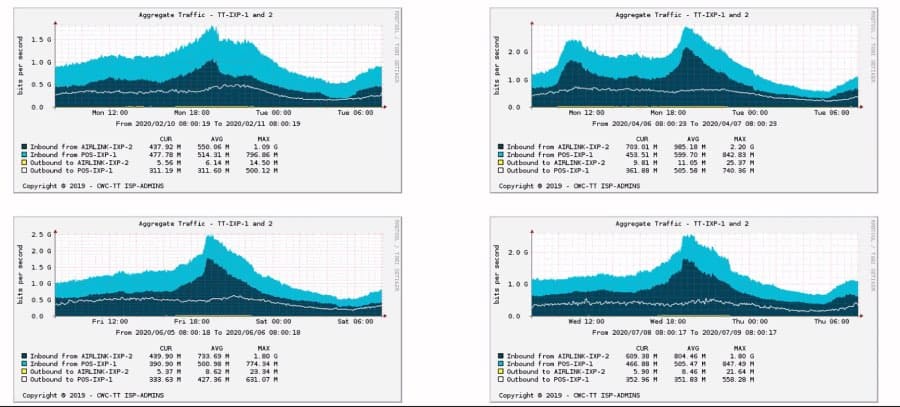
Above: Illustration by
Originally published in Newday’s BusinessDay for July 23, 2020.
In a perfect world, you wouldn’t have to think about how your computer connects to the Internet, and when things work, you don’t.
But this is the middle of a far from perfect world, and how the data that flows on the Internet makes its way around the world turns out to be pretty important, particularly when traffic has soared in the wake of covid19.
Last week the Caribbean Telecommunications Union (CTU) and American Registry for Internet Numbers (ARIN) teamed up to present a seminar on one solution, Local IXPs – No Longer an Option, Now an Imperative.
The online discussion examined how the Caribbean has been using Internet Exchange Points (IXPs) to design networks that keep Internet traffic local.
The Internet’s resilience is the result of a massively distributed design, which offers multiple routes for data to travel between source and recipient.
But that also means that an email, for example, might leave your computer, travel to a server in the United States or the UK, then return to be delivered to someone who lives in the next street.
Sometimes that has to happen, but often it doesn’t if an IXP exists in your country to keep local traffic local.
That’s why countries that generate large traffic for services like Google and Netflix get their own servers to deliver data.
The advantages of local routing and caching during covid19 deepened the value of the system for disaster resilience.
That isn’t always possible, but caching, a process that holds frequently accessed data is another way of dealing with the problem.
IXPs are a great place to hold frequently accessed data, along with routing capabilities that keep traffic for local websites and services in-country.
For ISPs, that can mean a significant savings on external broadband bills and it should come as no surprise that with TT’s enthusiastic use of the Internet, there are two IXPs in service.
That isn’t the case for some Caribbean countries though.
Grenada started its IXP five years ago and peering, the practice of connecting two separate networks to exchange data, started with just five megabits.
By 2020, the Grenada Internet Exchange was transferring 3.5 gigabytes of data locally and by March 2020, traffic from Akamai, a popular content delivery network (CDN) spiked dramatically, doubling when work and study from home data patterns became a daily reality.

“Critical infrastructure doesn’t have to be installed immediately, it can be built over time,” said Brent McIntosh, the peering coordinator of the Grenada IXP.
“Digicel went from being a 1GB partner in the IXP to a 10GB partner. IXPs are no longer nice to have, they are now a must have.”
“I spend a lot of time talking to ISPs about hosting local content. We are now hosting 16 local websites.”
“We are no longer looking at social media content, we are looking at opportunities to cache content that’s focused on national development.”
Creating the IXP in Grenada demanded a sales pitch to enable collaboration and explain the joint benefit.
Saving on the costs of going off-island and making the exchange of data more efficient were the selling proposition at the start, but the advantages of local routing and caching during covid19 deepened the value of the system for disaster resilience.

The parallels with what’s traditionally thought of as a natural disaster were driven home by Kurleigh Prescod, Country Manager for Columbus Communications and an early agitator for TT’s IXP implementation.
“Covid19 brought the kind of changes that are commensurate with a national disaster planning,” Prescod said.
In his monitoring of IXP traffic during covid19, Prescod noted that an early surge to 3 gigabytes during Carnival moved to 5GB after the covid19 lockdown, with a notable increase in online gaming and the use of productivity apps.
According to Prescod, 1.8 gigabytes is considered normal traffic for TT.
Without the IXPs in place, Prescod believes there would have been a significant drop in traffic response.

“If that had happened,” he said, “there would have been an impact on how working and learning from home would have been received.”
The CTU embarked on its regional Internet Exchange Point Proliferation Project in 2006.
“The CTU began promoting IXPs as an element in critical Internet infrastructure, between 2006 and 2008,” said Junior Mc Intyre, a consultant with the CTU.
The CTU formed alliances with CaribNOG and Packet Clearing House to raise awareness and encourage development between 2009 and 2010.
There are 15 IXPs in the Caribbean region with one in progress in St Kitts and Nevis. Five are considered dormant and installations in the French territories of Saint Barethelemy, Guadeloupe, Saint Martin and Sint Maarten are in the planning stages
“Most merely exchange traffic but some are now hosting content and services,” said Mc Intyre
“We are targeting the development of a Caribbean content industry and catalysing entrepreneurial activity, connecting public and private institutions, improving regional collaboration and coordination and incentivising regional, Internet-based growth.”

